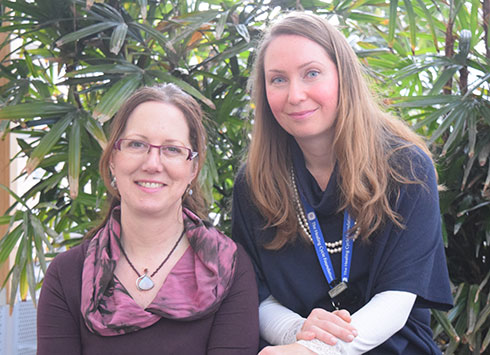
Clinical Nurse Specialist Sharon Reynolds (left) and Dr. Ebru Kaya say working in palliative care offers interaction with patients many other health-care professionals can only dream of. (Photo: UHN)
It's a career that makes you appreciate the little things in life – sunsets, brisk walks, fresh air.
As members of the Palliative Care Consultation Team at Toronto General Hospital, Dr. Ebru Kaya and Clinical Nurse Specialist Sharon Reynolds spend a lot of time facing mortality. Their job is working with people who have life-limiting illnesses. Their goal is to improve the quality of life for those people.
Most of their patients have less than a year to live. Many have three months or less.
Their work is a mystery to many, including colleagues in health care. And, it can come with a burden.
But it offers interaction with patients many other health-care professionals can only dream of. Those who work in palliative care serve a multitude of roles for those under their care – advocating; liaising with other care teams; easing pain and nausea; and helping facilitate tough discussions amongst family members while assisting the sick in reaching a level of acceptance and peace with their situation.
"The rewards are many," says Dr. Kaya. "You feel you're making a big difference in people's lives.
"This stage in people's lives can bring out the best and the worst. But most of the time, it's the best."
Each of UHN's four hospitals offers palliative care services. The broad range of services available includes clinics, in-patient consultations and providing the medical coverage for Kensington Hospice.
Related Links
Unique specialty
At Toronto General, the Palliative Care Consultation Team consists of Sharon, Dr. Kaya and three other physicians. They typically have a roster of 20 to 30 patients who are referred by their doctors and have a variety of life-limiting diseases, including cancer, heart, kidney and liver failure, chronic obstructive pulmonary disease and dementia. The team also works with transplant patients.
In other medical specialties, much of the treatment of a patient with a life-limiting disease is focused on symptoms. In palliative care, it's a much more holistic approach.
"It's a unique specialty in that the mandate is to take care of the whole person," Sharon says. "We don't deal only with physical symptoms like pain and nausea. We also provide support with the often difficult psycho-social aspects of what it means to have a life-limiting illness.
"Our role is to try to promote well-being and quality of life and comfort and that's all connected."
Sharon talks about the "intimacy and depth of conversation" she has with her patients, something that was much tougher to achieve in her previous two decades of nursing, including 17 years with the Medical Surgical Intensive Care Unit at Toronto General. She was initially drawn to palliative care after completing a Masters degree in bioethics in 2004 and has no plans to change specialties.
The widely-held perception that palliative care is only for those patients close to death is something both Sharon and Dr. Kaya are working to change. An increasing amount of research and expert opinion calls for the involvement of palliative care teams from the outset of diagnosis of life-limiting illnesses.
"We do more than just take care of people who are in the last few weeks or couple of months of their lives," Sharon says. "We also see people much earlier on.
"It doesn't mean you're dying when palliative care walks into the room."
Offering up perspective
Dr. Kaya had her first experience with palliative care when she was encouraged by a colleague and mentor to take a one-month rotation in the specialty while in third year residency in Internal Medicine in London, England.
"I felt like I'd found my little niche and I'd found a specialty I was comfortable doing, and could see myself doing for the rest of my working career," says Dr. Kaya, who went on to complete a four-year residency in palliative care in the United Kingdom before immigrating to Canada, joining UHN as an attending physician in palliative care at Princess Margaret Cancer Centre.
Both women say working in palliative care has a way of offering up perspective and even, at times, making them feel guilty about complaining about things in their own lives, no matter how legitimate. They offer each other and their teammates a lot of support and use coping mechanisms from humour to music to help them cope with what can be some emotionally difficult and draining situations.
"This specialty makes a person feel grateful for the stuff that we have, not just health but many things because it's not just health we get involved with," Dr. Kaya says. "I think it would be strange if we didn't.
"But we know we provide important services and we know we make a difference."
